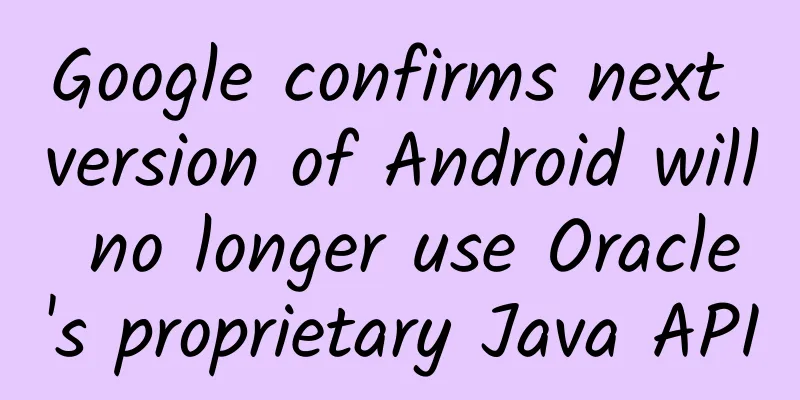Google confirms next version of Android will no longer use Oracle's proprietary Java API

|
Google is planning to switch Java application programming interfaces (APIs) from Oracle's proprietary Java Development Kit (JDK) to the open source OpenJDK. Hacker News first exposed the "mysterious Android code base" last month, and Google also confirmed to VentureBeat that "Android N" will only rely on OpenJDK, rather than Android's own version of the Java API.
A Google spokesperson told VentureBeat:
Android provides some Java API libraries to support application development in the Java programming language, which are mainly divided into two parts - APIs for the library, and deployment code developed by Google that enables the library to work. As for Java's current owner, Oracle, there are two implementations of these libraries - the proprietary JDK version, and the open source OpenJDK version. Google decided to "consolidate" its efforts on OpenJDK, which Android already uses in some places, which means the company will share its implementation code. Initial import of OpenJdk files. Create new libcore/ojluni directory with src/main/java and src/main/native subdirectories. Build ojluni into core-oj jar. Use openjdk classes from java.awt.font package. Copy all files from jdk/src/share/classes and jdk/src/solaris/classes directories in openjdk into libcore/ojluni/src/main/java. Copy following native files from openjdk to libcore/ojluni/src/main/native: [long list of files] The "code commit" mentioned above indicates that 8902 files have been changed, which clearly indicates that the OpenJDK code has been added to Android. Google hopes that developers will be happy with this change because it simplifies the code they use to build applications (common code for these Java API libraries instead of multiple code bases). |
<<: The Programming Story of Little Printf: Chapter 2
>>: 13 Wearable Technology Trends to Watch in 2016
Recommend
Baidu promotion bounce rate, bidding hosting website bounce rate solution?
In this era of rapid development, if you want to ...
User Activation: Breaking Down Luckin Coffee’s New User Activation Process
There are many ways to attract new customers to y...
Gartner: Apple's global smartphone market share dropped to third place in the first quarter
Against the backdrop of a shrinking global smartp...
Live broadcast, interaction, personal IP, the trend of electric vehicle industry marketing gradually becoming fan circle can be stopped
If you stand in the right place, even a pig can f...
2022 Lithium Battery White Paper: Lithium Battery Recycling, a Promising Future
1. Based on commercial reality, it is expected th...
When will the Shanghai epidemic end in 2022 and return to normal? Can May Day end and return to normal? Attached the latest news
Recently, the number of new local cases and asymp...
How to keep App users!
After many carefully crafted apps are put on the s...
How to carry out refined operation and promotion?
Precise operational promotion has become a rigid ...
Yu Rongguang resume: SEO traffic can be so simple
What is optimization? Optimization is to take cer...
The current situation and trends of Internet advertising!
Since the second half of 2018, the saying that di...
Apple fans have been posting a lot of comments on VoLTE on their WeChat Moments. What exactly is it?
Some time ago, Apple and China Mobile pushed an op...
Duomai Alliance · Douyin search top optimization, no nonsense, speak the truth, value 599 yuan
Duomai Alliance · Douyin search top optimization,...
Why is everyone fleeing Windows 10?
About two weeks ago, Microsoft released Win10 SDK...
These 19th-century green books are beautiful but poisonous
Image source: PhilaAthenaeum via Youtube The book...
Changsha’s tea tasting studio is built in. Where is the most reliable tea drinking place?
Changsha Tea Tasting Studio has its own arrangeme...









